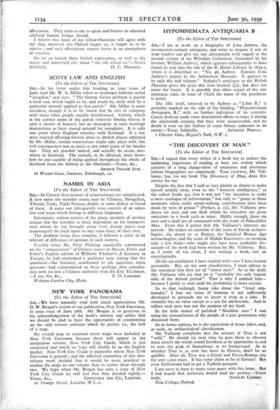4, THE DISCOVERY OF MAN " [To the Editor of
THE SPECTATOR]
Sta,—I expect that every writer of a book has to endure the saddening experience of reading at least one review which consists of a long charge-sheet of omissions and absentees (where biographies are concerned). Your reviewer, Mr. Vul- liamy, has, for my book The Discovery of Man, done this service for me.
Despite the fact that I said so very plainly as almost to make myself unduly clear, even to the " meanest intelligence," as the school books say, that it was not " my intention to make a mere catalogue of achievement," but only to " pause at those moments when really epoch-making contributions have been made by men of genius " (Preface, p. 12), Mr. Vulliamy pro- duces six men and one skull whom he considers are gross omissions in a book such as mine. Oddly enough, those six men and a skull are all concerned with the study of Palaeolithic Man. From this I gather that Mr. Vulliamy's interests" are narrow. He makes no mention of the score of Greek archaeo- logists, the dozen or so Roman, the hundred Bronze Age archaeologists, and the score of Middle Easterners—to mention only a few fields—who might alsio have been profitably dis- cussed—if the book had been written by Mr. Vulliamy. But, as I made all too clear, I was writing a book, not an encyclopaedia.
All his six candidates I have studied well—two I have known personally. But, on my own classification, I must adhere to the statement that they are all " minor men." As to the skull, Mr. Vulliamy tells me that he is " probably the only hutnan relic of the Acheul period." That is why I omitted him— because I prefer to wait until his probability is more certain.
As to that rockingly funny joke about the "fossil sala- mander," I fear my sense of humour is not sufficiently developed to persuade me to insert it even as a joke. It certainly has no value except as a jest for adolescents. And to collect such jests was not the purpose of my book.
In the little matter of polished " Neolithic axes " I was using the nomenclature of the people of a past generation who discussed them.
As to homo sapiens, he is the equivalent of homo faber, and, as such, an archaeological classification.
Mr. Vulliamy complains that the scenery of Troy is not " wild." He should try next time he goes there to observe more closely the woods round Erenkeui as he approaches it, and to note the peak of Samothrace as its background. As to whether Troy is or ever has been in Greece, don't let us quibble. After all, Troy was a Greek and Greco-Roman. city for over ',zoo years. It has some claim to be in Greece! But even Schliemann had to get a Turkish passport.
I am sorry to have to waste your space with this letter. But I had hoped that reviewers would read' ray preface.—Yours










































 Previous page
Previous page